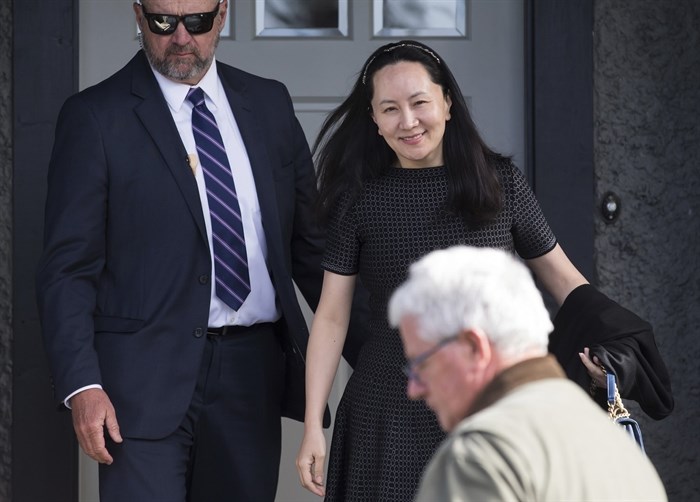
Huawei chief financial officer Meng Wanzhou who is out on bail and remains under partial house arrest after she was detained Dec. 1 at the behest of American authorities, smiles as she leaves her home to attend a court appearance in Vancouver, on Wednesday May 8, 2019.
Image Credit: THE CANADIAN PRESS/Darryl Dyck
May 08, 2019 - 8:00 PM
VANCOUVER - The defence team for Huawei executive Meng Wanzhou says it plans to argue that she shouldn't be extradited to the United States because she hasn't committed fraud under Canadian laws and her arrest at Vancouver's airport was unlawful.
The defence summarized arguments it plans to pursue during a hearing Wednesday at B.C. Supreme Court where key court dates were to be set for the extradition case, which has not yet begun.
Her lawyers allege Meng was the victim of an "abuse of power" and they plan to make an argument based on "double criminality," related to different sanction and fraud laws in the United States and Canada.
John Gibb-Carsley, the lawyer for the Attorney General of Canada, asked Justice Heather Holmes to allow the case to proceed as quickly as is fair and possible, proposing the first date by the end of August.
He called the focus on sanctions a "complete red herring" and said the allegations against Meng centre on an alleged misrepresentation she made to a bank that put that bank's economic interests at risk, adding it's not yet time to make arguments in the case.
The defence said it needs more time to gather documents through freedom of information requests and it wants audio from Meng's questioning at the time of her arrest, which has already been alleged to have been unlawful in a civil lawsuit.
READ MORE: Canadian lawyer for Huawei executive cites Trump comments
Benjamin Howes, vice-president of media affairs at Huawei, said in a statement that Meng intends to apply to the court for a stay of the extradition proceedings.
"From the beginning, Huawei has expressed extreme confidence in Ms. Meng's innocence. We have maintained that her U.S.-ordered arrest was an unlawful abuse of process — one guided by political considerations and tactics, not by the rule of law," he said.
The criminal case against Meng is based on allegations that are "simply untrue," and Meng's business activities were conducted openly and transparently with full knowledge of banking officials, Howes said.
The U.S. Department of Justice laid 13 criminal charges, including conspiracy, fraud and obstruction, against Huawei and Meng, who is the daughter of company founder Ren Zhengfei. The indictment accuses Huawei and Meng of misrepresenting their ownership of a Hong Kong-based subsidiary between 2007 and 2017 in an effort to circumvent U.S. sanctions against Iran.
Meng is alleged to have said Huawei and its alleged subsidiary Skycom were separate companies in a PowerPoint presentation during a meeting with an executive of a financial institution, misleading the executive and putting the institution at risk of financial harm and criminal liability.
Howes said the PowerPoint was not misleading, the bank had knowledge of the nature of Skycom's business and operations in Iran, and the bank understood the relationship between Huawei and Skycom.
"Therefore, no evidence to prove that Ms. Meng committed acts of any wrongdoing exists," Howes said.
He said Huawei would share more information regarding the financial institutions involved in coming days. The court has previously heard that Meng met with HSBC.
Howes also said the actions directed in part by the FBI led to "serious and repeated" violations of Meng's rights under the charter.
RCMP intentionally delayed the presentation of the arrest warrant in order to carry out an unlawful detention and search against Meng, under pretence of a routine border check, he alleged. Her luggage was searched, her cellphone and other electronic devices were taken at the direction of the FBI, and she was compelled to reveal her passwords, Howes said.
Mounties did not immediately respond to a request for comment.
Howes also said double criminality is a core principle of the Canada-U.S. extradition treaty and Canadian extradition law, and Meng's arrest violated this principle.
He said the allegations against Meng are based on violations of U.S. sanctions against Iran, but Canada does not impose sanctions on financial services in relation to Iran, and because of this, the allegation she faces is not a crime in Canada.
The case has set off a diplomatic furor, with China's embassy calling it a "political persecution.'' After Meng's arrest, two Canadians were detained by Beijing and Chinese state media has said they face allegations of spying.
A Chinese court also sentenced a Canadian to death in a retrial on allegations of drug trafficking, overturning a 15-year prison term handed down earlier. China is also blocking imports of canola from Canada.
Meng has been under house arrest since mid-December at one of her two multimillion-dollar Vancouver homes.
News from © The Canadian Press, 2019